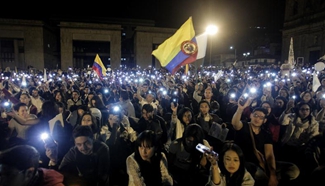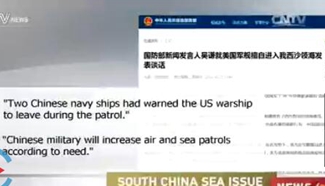LOS ANGELES, Oct. 22 (Xinhua) -- The U.S. Internet stewardship change beginning October has no effect that people should be nervous about, Christopher Mondini, vice president of the Internet Corporation for Assigned Names and Numbers (ICANN), has said at the GetGlobal 2016 in Los Angeles.
With the move, the government of the United States let go of its remaining control of the net's address book to ICANN, a California-based nonprofit, whose multiple stakeholders include academics, technical experts and representatives of governments and businesses, among others.
The transfer involves the Internet's domain name system, or DNS, which translates the Web addresses users type into the browser into the numerical language that net-connected computers use to communicate.
"There is no effect that people should be nervous about," Mondini told Xinhua on Thursday, during the GetGlobal 2016 conference and expo.
According to Mondini, Internet users will see no change or difference in their experiences online as a result of the stewardship change.
The U.S. transfer of Internet control fully to private sector occurred when the ICANN contract with the U.S. National Telecommunications and Information Administration of the Department of Commerce to perform the Internet Assigned Numbers Authority functions officially expired on Oct. 1.
The transfer has received widespread support from the digital community. It will help ensure that the Internet remains open, interoperable and stable in the long term, according to the ICANN.
However, when talking about how the U.S. media covered the change, Mondini thought the headlines were "sometimes confusing."
"I think in the United States there are some misunderstandings," Mondini said. "Some people don't understand very well how the Internet address system works, and they believe that there are something much more significant than it actually is."
"You can see that the headlines to talk about 'control' in the Internet really don't make sense, because the system was designed to be uncontrolled, distributed and decentralized," he said.
Who controls the Internet? Mondini's answer is "nobody," because the global Internet is "uncontrollable."
"It's human nature that everybody wants to find out who is in charge ... but that is not something you can do with the Internet," Mondini said.
Meanwhile, "it's understandable that there is increasing interest in Internet policy issues," he said, but the way how the Internet actually works remains a "mystery" for a lot of people.
The ICANN senior official said the global Internet is a "system that puts 3.5 billion people on the network. Each other connects to each other right now."
In fact it's the tens of thousands of independent operators and networkers that choose voluntarily to use standards, protocols and address systems to connect them, he said.










